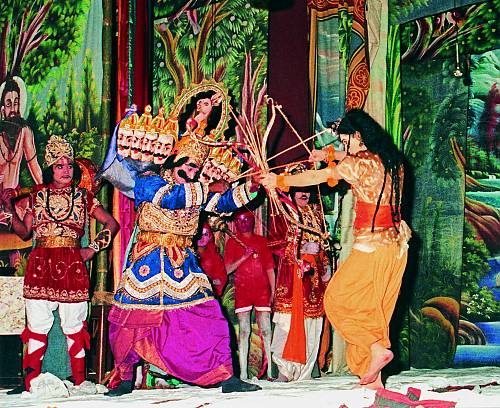Ramleela's Global Odyssey: Cultural Diplomacy in a Complex World
Ramleela, the dramatic reenactment of the Indian epic Ramayana, has indeed traveled far from its origins in India and holds a unique place in the global cultural landscape. This phenomenon can be attributed to several factors, including migration, globalization, and the universal themes it embodies. Let's discuss the journey of Ramleela, its relevance in today's complex globalized world amid regional tensions, its various versions worldwide, and similar folklore performances from other cultures.
Bureau of Society and Transformation
10/24/20232 min read


Ramleela, meaning "Rama's play," is believed to have originated in India, possibly around the 16th century. Over time, it has not only spread within the Indian subcontinent but also transcended borders to become a part of the global cultural fabric. Its global journey can be attributed to the following factors:
Migration: The Indian diaspora, comprising millions of people around the world, has played a significant role in carrying the tradition of Ramleela to various countries. As Indians migrated to different parts of the world, they took their cultural heritage with them, including Ramleela.
Globalization: In the era of globalization, cultural exchange has become more accessible. The internet, media, and international travel have facilitated the sharing cultural practices, making Ramleela more widely known.
Universal Themes: The Ramayana, at its core, explores universal themes such as love, duty, righteousness, and the victory of good over evil. These themes resonate with people from diverse cultures, making Ramleela relevant to a global audience.
Relevance in a Complex Globalized World: In today's globalized world, where regional tensions and conflicts persist, Ramleela holds relevance in several ways:
Cultural Diplomacy: Ramleela serves as a form of cultural diplomacy, fostering understanding and cooperation between nations. It offers a platform for people from different backgrounds to engage with a shared cultural heritage.
Promotion of Peace: The Ramayana's emphasis on moral values and dharma (duty) can serve as a means to promote peace and reconciliation in conflict-ridden regions.
Cultural Exchange: Ramleela encourages cultural exchange, which can lead to a deeper appreciation of different cultures and traditions, helping bridge gaps in a complex globalized world.
Various Versions Across the World: Ramleela has taken on various forms and adaptations in different parts of the world. Some notable versions include:
Trinidad and Tobago: The Caribbean nation of Trinidad and Tobago has a rich tradition of Ramleela, which has been influenced by Indian immigrants who brought the practice with them. The local adaptation, known as "Hosay" in Trinidad, combines elements of Indian culture with Afro-Caribbean influences.
Indonesia: The Indonesian island of Bali has its own version of the Ramayana called the "Ramayana Ballet," which is performed through traditional Balinese dance and shadow puppetry.
Thailand: The Thai version of the Ramayana is known as the "Ramakien." It incorporates Thai folklore, culture, and art forms into retelling the epic.
Cambodia: The Cambodian version of the Ramayana, known as the "Reamker," has profoundly influenced Cambodian art, dance, and theater.
Similar Folklore Performances from Other Cultures: There are several other folklore performances from different cultures that have traveled far from their places of origin:
Greek Tragedy: Ancient Greek tragedies, such as those by Aeschylus and Sophocles, have influenced theater and storytelling worldwide.
Chinese Opera: Traditional Chinese opera, including Peking opera and Kunqu opera, has been performed and adapted in various countries, including the United States and Japan.
Japanese Noh Theatre: Noh, a traditional Japanese form of theater, has had a significant impact on the global performing arts scene.
Shakespearean Plays: The works of William Shakespeare, including plays like "Hamlet" and "Romeo and Juliet," are performed worldwide and adapted into various cultural contexts.
In summary, Ramleela has traveled from India to many corners of the world due to migration, globalization, and its universal themes. Its relevance in today's globalized world lies in its potential to foster cultural understanding, promote peace, and encourage cultural exchange. Similarly, there are other folklore performances from various cultures that have also spread globally, showcasing the enduring power of storytelling and theater in transcending boundaries and connecting people across the world.
(With AI Input)
Contacts
enquiry@economicnations.org
(xx) 98-11-937-xxx (On verification)
